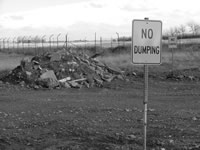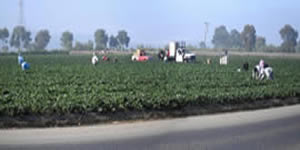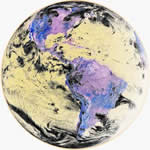Industrial Agriculture vs. Organic Farming:
Better Living through Chemistry?
By Joshua Coates

Both industrial and organic farming advocates have promised to save us, but why should we believe that industrial farming could be our savior when the mess we need saving from is a result of their actions? Since the dawn of the industrial age we have been fed lies about how industrial farming will end hunger, but it has only increased. Kimbrell discloses that “during the last 35 years, per capita food production has actually grown 16 percent faster than the world’s population.” He goes on to explain that “during industrial agriculture’s prime, the number of hungry people in every country except China, actually increased by more than 11 percent.”

The premise that world hunger is caused by a shortage of food and that industrial agriculture can provide more food and thus end hunger is clearly a myth we need to stop clinging to. We have been promised better living through chemistry for over half a century, but all we have gotten is widespread death and disease from chemicals, the eradication of native plants and animals, overflowing landfills packed with needless packaging waste and a planet as unhealthy as its citizens.
Organic farmers do not have the resources to fight the industrial machine and its litany of lawyers, PR agents, and media control by themselves. It is up to all of us to bring about change. However, one delicious, non-poisoned vegetable at a time, your neighborhood organic farmers are showing consumers the real value of food grown without poisonous chemicals. Entire generations of Americans have grown up only ever having known processed food devoid of nutritional value, so it is understandable that organic farming may seem like some new, small, radical movement. However, it is merely a return to methods used for centuries before industrial chemicals offered us “progress.”

Andrew Kimbrell writes, “Industrial ‘progress’ leads us to a future of increased environmental devastation, mass starvation, social disruption, and corporate control of the seeds of the Earth. Clearly this is not progress.” He is not alone in this view. The organic movement is growing, and the masses are being educated. We all are implicated in the destruction of our planet, the eradication of countless species of plants and animals, and the deterioration of the health of our own species. Industrial farming may have played a huge part, but only because we have allowed it to do so. Only we can undo the damage that has been done. It may even be too late, but in case it is not, we are obligated to do everything in our power to try.
Considering the evidence, nothing short of a revolution in the way we produce and enjoy our food will be enough. It is time we wake up and stop believing the lies agribusiness has been feeding us and take matters into our own hands. We must stop buying industrially produced goods, start supporting our local farmers, educate ourselves at every opportunity, and whenever possible, grow our own food. While you may think that the price of organic food is way too high, the truth is that the prices are getting lower all the time. If you take into account the real costs of industrial farming to your health and the health of the planet, and the rising costs of industrial packaging and transport, you can’t afford NOT to buy organic.
You may also wonder how and where to buy organic food, or feel you wouldn’t know how to prepare it if you did buy it. The truth is, organic food is available almost everywhere industrial food is. Also, organic doesn’t mean “health food” or a vegetarian diet; it simply means buying food grown without toxic herbicides and pesticides. Most foods you are used to eating are available in organic versions. Not only that, but organic food generally tastes better and has more nutrients because it is grown in nutrient-rich soil that can only be present when monoculture farming is not employed. If organic produce sometimes seems less uniform in appearance, or less brightly colored than conventional produce, it is only because it has not been artificially colored and flavored and genetically manipulated into an illusion of perfection. Furthermore, it is not only a matter of personal taste, choice, or circumstance. The future of our planet and our health depend on it.
Almost a century ago we were promised a future without hunger, with abundance for all. What have actually been delivered are starvation, disease, and destruction of the planet we depend on for survival. It is time to stop believing the lies and take matters into our own hands, time to reverse the damage that’s been done and plant the seeds of a new future for ourselves. Are you up to the challenge?
References
Kimbrell, Andrew, ed. Fatal Harvest: The tragedy of Industrial Agriculture. Island Press:
Washington, Covelo, London, 2002. Print.
Weale, Albert. “Ethical arguments relevant to the use of GM crops.” New BiotechnologyVol. 27, Number 5 (2010): 582-587. Print.
Qaim, Matin. “Benefits of genetically modified crops for the poor: household income, nutrition, andhealth.” New Biotechnology Vol. 27, Number 5 (2010): 582-587. Print.
Conko, Gregory, and Henry I. Miller. “The rush to condemn genetically modified crops.” PolicyReview 165 (2011): 69+
Judeen Bartos, Ed. "Genetically Modified Foods Provide Safe and Healthy Choices for Consumers"Agricultural Biotechnology Council Food Safety At Issue Series. Greenhaven Press. (2011)
Berry, Wendell. “The Pleasures of Eating.” Taken from “What are people for?” New York; North PointPress, 1990. Print.
About the author

Joshua Coates is an artist and writer living in Brooklyn, New York. Though his formal education was rooted in fine art, he is also a passionate advocate of local organic agriculture. He lived and worked in Denver, Portland, and Seattle before moving to New York City. He especially loves using other people’s garbage to create fine art.
Did you like the article? Subscribe here to our New Article Email Alert or RSS feeds.
Sharing is caring! Don't forget to share the love, and keep the conversation going by leaving a comment below:
Advertisement

 "The Ties that Bind," acrylic on salvaged plywood by Joshua Coates
"The Ties that Bind," acrylic on salvaged plywood by Joshua Coates